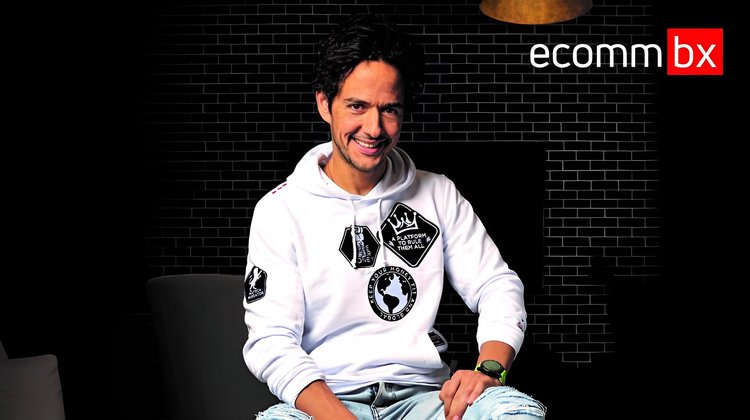ECOMMBX CEO Michael Charalambides: It will be survival of the fittest for banks and EMIs
Athena Yiazou 07:11 - 23 June 2023

When Electronic Money Institutions and banks are allowed to compete properly, it will first be all about which makes the best use of technology and will eventually result in the integration of the banking system with the Fintech industry, says ECOMMBX CEO Michael Charalambides.
In the not-so-distant past, the title of Chief Executive Officer (CEO) would automatically conjure up the image of a severe businessperson, probably wearing an even more severe suit. Of course, this did not mean that such CEOs did not possess lively personalities; it was simply a clear indication that the business and banking world demanded a certain degree of formality in both their behaviour and attire, to which many senior figures still feel the need to conform today.
Upon meeting Michael Charalambides, CEO of ECOMMBX, for the first time, it quickly becomes clear that he feels no such need to conform. He is a perfect example of why business suits are no longer mandatory if one wishes to be taken seriously. Even a few minutes of conversation with jeans-clad Charalambides prove that a suit and tie have nothing to do with whether someone has sound business ideas or a strong professional drive. His seemingly boundless energy made our conversation speed by and, a few minutes afterwards, I appreciated the opportunity to collect my thoughts in the comfort of the spacious and imaginatively decorated ground-floor lounge space of the ECOMMBX offices.
During our interview, even the lounge's giant screens featuring mountain views and lively music, albeit at a discreet volume, were not enough to take attention away from Charalambides and what he was saying.
ECOMMBX specialises in B2B e-account management, cross-border payments and competitive currency conversions and our talk covered more related topics than it would be possible to include here. Charalambides was happy to share his expertise but concerned about whether his messages would come across properly and how accurately my questions were phrased. For example, when asked about how overseas banks have begun to build bridges with Electronic Money Institutions (EMIs) and whether he thinks this has also begun in Cyprus, he was quick to tell me, "I'm not sure if I agree with the statement that overseas banks have already established their relationship with EMIs. That’s a very generic assumption to have for the whole industry. I would rather say that some banks from the European Union have started a partial collaboration with some specific EMIs or payment institutions in Europe as they try to meet the expectations of the PSD2."
This reference was to a topic that Charalambides was less eager to talk about, describing the Payment Services Directive (PSD2) as "very outdated".
"Personally, I believe we should already have been talking about PSD3 for at least one or two years now," he said, explaining that, "Some banks did try to have a collaboration with some Fintech EMIs and payment institution companies in Europe, but they're still very strict about the criteria, who they work with and why."
He continued, "There's always an objective behind the collaborations between a bank and a payment institution or a Fintech and I would say that, as with everything that happens in the European Union, it is amplified in Cyprus in a rather more prudent way."
Charalambides went on to express his belief that, "We're less adaptive in Cyprus and, maybe because of our culture, maybe because we're a Mediterranean country, maybe because we're all still hot-headed – including myself! – we are less likely to trust easily."
This, the CEO continued, meant that it was more difficult for EMIs to collaborate with certain banks in Cyprus, although those with a stronger European identity were more collaborative and interested in working with EMIs like ECOMMBX.
He was also quick to point out that any conversation about the banking industry today would be vastly different from one three or four years ago and certainly before the pandemic.
While an exact timeframe may not be possible to pin down, Charalambides believes that developments over the coming years will eventually result in the integration of the banking system with the Fintech industry.
"The two will argue, they will come into conflict, and they will fight each other for domination – Fintech, and banking – because they are both stepping on the same rails when it comes to doing transactional business. So, it is going to be all about the survival of the fittest if they are allowed to compete," he said.
Charalambides then elaborated on what he expects to happen. “What we are seeing is the downgrading of the existing banking framework and it might be intentional. So, the concept of banks is weakening as well and, at the same time, technology keeps progressing and trickling down into filtered institutions, so it is empowering them as well as bringing them to the same level, where they will be able to eventually work together and become one. The industry will not be segregated."
He noted that, perhaps over the next 10 years, "We will see two things happening. One is going to be the elimination of payment institutions and EMIs. There will be no reason for them to exist. Rather, we will see technology companies offering the white-label products of the banks, and we are also going to see banks which will specialise in a multi-levelled licensing service.”
“What do I mean by that?” Charalambides asked, before answering, “We are going to see banks that focus exclusively on retail, which has to do with individuals, with loans and retail markets. Then there will be banks that specialise in B2B services. Then we’re going to see banks that specialise in investment products and others that specialise in the upstream market: on serving other banks."
And having shared his predictions about the future of the banking industry, the extraordinary Michael Charalambides was off to another meeting.

